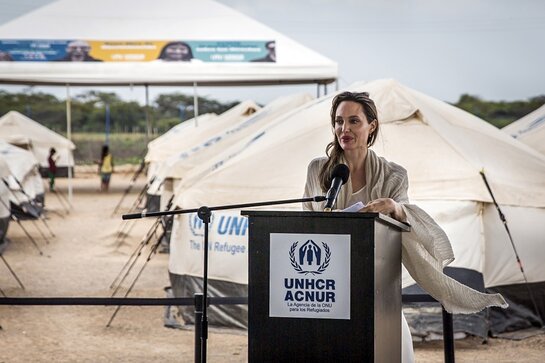UNHCR Special Envoy Angelina Jolie traveled to Colombia’s border area with Venezuela on Friday to assess the humanitarian response to the exodus of Venezuelan refugees and migrants – the largest and fastest movement of people in Latin America’s recent history.

Jolie’s two-day mission evaluated the enormous challenges that Colombia and other host countries are facing in responding to this unprecedented crisis.
During her visit, the Special Envoy, together with UNHCR’s Deputy High Commissioner, Kelly Clements, met with the Colombian Government and various organizations contributing to the humanitarian response along with Venezuelans and Colombians hosting them.
“In 2002, 2010 and 2012 I was in Ecuador visiting some of the many Colombians who had fled the conflict,” said Angelina. "I said to the families that I met that I looked forward to visiting Colombia itself, when peace made it possible for refugees to return.
“Today, I have met returning Colombian refugees, but not for the reasons I had hoped. Over 400,000 Colombians, who had been displaced to Venezuela, have now been forced to return by the catastrophic situation there. They are alongside 1.3 million Venezuelan refugees who have sought protection in Colombia.
“In addition, 3.3 million Venezuelan nationals are crossing the border for short periods of time, to find supplies and basic assistance. The impact on public services here in Colombia is staggering. Some border hospitals are now providing emergency health care to as many Venezuelans as Colombians. Many schools have doubled the number of students in their classrooms.
“But Colombia still has kept its border open, and is doing everything it can to absorb these unprecedented numbers of desperate people. Colombians know displacement all too well. This country has experienced fifty years of war. Its peace agreement is less than three years old, and fragile.
“It is extraordinary that a country facing so many huge challenges of its own, has shown such humanity and is making these live-saving efforts. I want to acknowledge the bravery, strength and resilience of the Colombian people.
“The situation here in Colombia, and in Peru and Ecuador, puts the debate and rhetoric on refugee issues in many peaceful countries, including my own, into humbling context.
“Despite what that political rhetoric often implies, less than 1% of all refugees are resettled in western nations.
The vast majority of the world’s uprooted people are displaced within their own borders, or have crossed into neighbouring countries like Colombia.
“Looking across the world, it seems that often those who have the least give the most. The humanitarian appeal issued by UNHCR and its partners in December last year is less than a quarter funded – 21% funded to be exact.
In the meantime, the number of Venezuelan refugees and migrants has risen to over 4 million.
“This is a life and death situation for millions of Venezuelans. But UNHCR has received only a fraction of the funds it needs, to do even the bare minimum to help them survive. The countries receiving them, like Colombia, are trying to manage an unmanageable situation with insufficient resources. But neither they nor humanitarian actors like UNHCR are getting the funds they need in order to keep the pace with the influx, and yet they still do everything they can.
“This is not only true of the Venezuela crisis. This picture of soaring numbers and declining funds is replicated internationally.
“On 20th June we mark World Refugee Day. UNHCR expects another significant rise in the overall numbers of displaced people worldwide, and a fall in the number of people being able to return home – as the vast majority of refugees I have met long to do.
“Instead of focusing on how to address the gap in diplomacy and security and peace that is causing this number of people to move, we hear increasing talk of what individual governments are no longer prepared to do: whether that is to receive refugees or asylum seekers, or to contribute funding to UN operations and appeals.
“With the numbers of refugees worldwide rising so fast, it is naïve at best and duplicitous at worst to present these policies as if they were some kind of solution. When your neighbor’s house is on fire, you are not safe if you simply lock your door.
“Leadership is about taking responsibility, as generations before us took up their responsibility to address threats to peace and security and build a rules-based world order. We need that kind of leadership again now, urgently.
“In the meantime, it is not possible to put a value on the support that Colombia and Peru and Ecuador are giving to the people of Venezuela, because it is the core of what it is to be human.
“The human response is to not turn a blind eye. It is to acknowledge your fellow men and women and their suffering. It is to work towards solutions, no matter how hard.
“And above all, the human response is not to blame a victim of war or violence for their circumstances, or for their requests for help for their defenseless children. Today we need that humanity more than ever, and rational thinking from people who are unafraid to take responsibility and show leadership.
“That will be my message as I leave Colombia and in the months to come, as I try to follow up on what I have observed in the last two days. I will not forget what I have seen here, I will not forget the Venezuelan people I have met here. My heart is with them, and I hope to return again soon.”
The Special Envoy focuses on major displacement crises, representing UNHCR and the High Commissioner at the diplomatic level. She last visited the Latin America region in October 2018, when she highlighted the situation of Venezuelan refugees in Peru.





